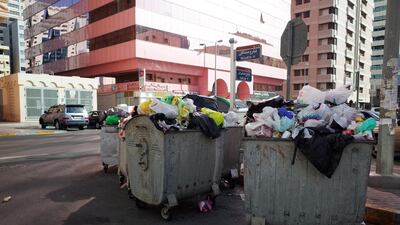ABU DHABI // Restaurants and cafeterias are dumping cooking oil and discarded food in roadside bins because proper disposal facilities are not available in the capital.
In residential streets in many areas of the capital, bins overflow with trade waste. Owners and staff claimed they have little choice, but the practice is damaging the environment and littering communities with rubbish.
The practice came to light as Tadweer, the centre for waste management in Abu Dhabi, begins development of a programme to collect all waste oil.
An operation was launched in Dubai where crews collect more than 227,00 litres of discarded food oil a day – a result of the city’s fast-food culture.
Mary Bagano, a supervisor at Philippine House Restaurant, said premises did not know what to do with used cooking oil.
“Whatever is left from the tables of customers, we throw that in the rubbish bins and into the used oil. But we don’t drain the oil in sewers.
“We put oil in plastic bags and pay every year for dumping waste at the designated sites. We don’t have any other place to put it.
“We strive to minimise the use of oil at the restaurant.”
If dumped down a drain, one litre of oil contaminates up to 1,000 litres of water, according to estimates by environmental experts. The oil hardens into thick layers, choking drain pipes and sewers. This restricts water flow and requires strong chemicals to unclog pipes. The fine for improper disposal of waste water is up to Dh100,000.
Saeed Al Mazrouei, owner of Al Ibrahimi restaurant chain, said efforts were made to minimise how much food and oil is thrown out.
“The leftover food collected from dining tables of customers is dumped in waste bins.
“But we have more than 5,000 staff working for us, so we give whatever is left at closing time to them,” Mr Al Mazrouei said.
“The discarded frying oil is sold and sometimes we give it free to our regular customers.”
Some businesses, such as the Black Tea cafeteria in central Abu Dhabi, also sell used oil to make money and avoid waste – but they cannot guarantee what happens to it after that.
“We collect the used oil in containers and sell it, but most other discarded food and leftovers go to waste bins,” said Nizar, a staff member. He sells a 17-litre container of oil for Dh30.
“We can’t drain it because municipal inspectors will fine us,” he said.
Rafael Sanjurjo Lopez, regional general manager at Blue, a waste management company that runs a fat, oil and grease recycling plant with Dubai Municipality, said the city had faced a major environmental problem before the scheme started.
“Thousands of kilometres of sewer lines get clogged by these fatty oils being drained in sewers. It created an environmental threat,” he said, describing the necessity for all cities to treat their oil waste.
“Once discharged into the open it contaminates the environment, seas, underground water resources and soil, along with posing health hazards.
“Since 2009 until now, we have treated 53 million gallons of food fats and grease, which was once running through sewage lines.”
anwar@thenational.ae

